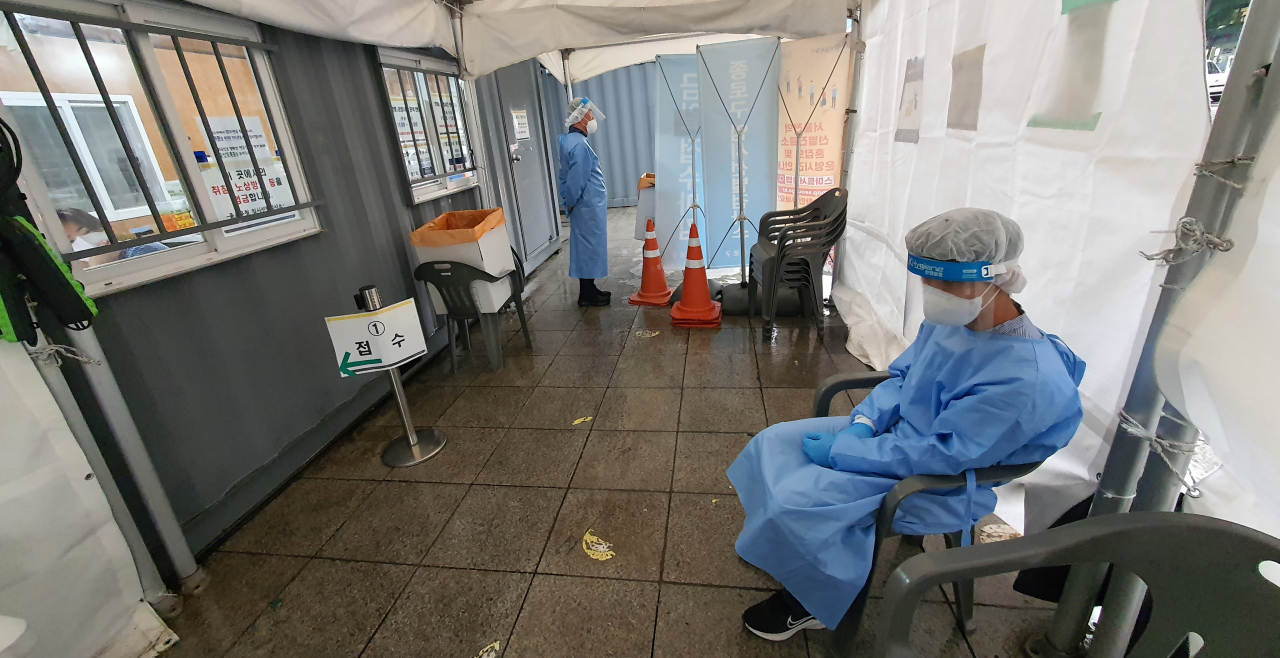 |
Medical workers stand by at a quiet COVID-19 testing booth in Seoul's central district of Jongno, in this photo taken last Wednesday, amid a decline in the infection numbers. (Yonhap) |
South Korea's new coronavirus cases fell below 20,000 for the first time in six days on Sunday in a downward trend in virus cases amid the government's effort to move the country back to pre-pandemic normalcy.
The country added 19,298 new infections, including 24 cases from overseas, bringing the total caseload to 17,957,697, the Korea Disease Control and Prevention Agency (KDCA) said.
The daily tally jumped to 35,104 cases on May 17 from the previous day's 13,290 but continued to fall to 23,462 on Saturday.
South Korea's new infections have been on a downward trend in recent weeks after peaking at over 620,000 on March 17 amid the spread of the omicron variant.
The country added 54 deaths from COVID-19, putting the total at 23,965. The fatality rate stood at 0.13 percent. The number of critically ill patients fell to 229 from 235 a day earlier, the KDCA said.
South Korea has lifted most of the virus restrictions, such as the cap on private gatherings and business curfews, as the decline in the virus cases has given a boost to the government's efforts to restore pre-pandemic normalcy.
Still, the government announced on Friday that it will push back the plan for the next relaxation steps, including the lifting of a seven-day quarantine mandate for COVID-19 patients, for another four weeks to June 20.
South Korea remains cautious as another resurgence of the virus could hit the country in the summer and peak between September and October. If the quarantine requirement is scrapped, the caseload could bounce back by up to 4.5 times between June and July, according to the government's forecast.
Of the locally transmitted cases, Seoul accounted for 2,899, with its surrounding Gyeonggi Province taking up 4,266 cases. There were also 796 additional patients from Incheon, 40 kilometers west of the capital city.
As of midnight Saturday, 44.57 million, or 86.9 percent of the population, had completed the full two-dose vaccinations, and 33.26 million, representing 64.8 percent, had received their first booster shots. More than 3.8 million people had gotten their second booster shots, the KDCA said. (Yonhap)



![[Herald Interview] 'Trump will use tariffs as first line of defense for American manufacturing'](http://res.heraldm.com/phpwas/restmb_idxmake.php?idx=644&simg=/content/image/2024/11/26/20241126050017_0.jpg)

![[Health and care] Getting cancer young: Why cancer isn’t just an older person’s battle](http://res.heraldm.com/phpwas/restmb_idxmake.php?idx=644&simg=/content/image/2024/11/26/20241126050043_0.jpg)

